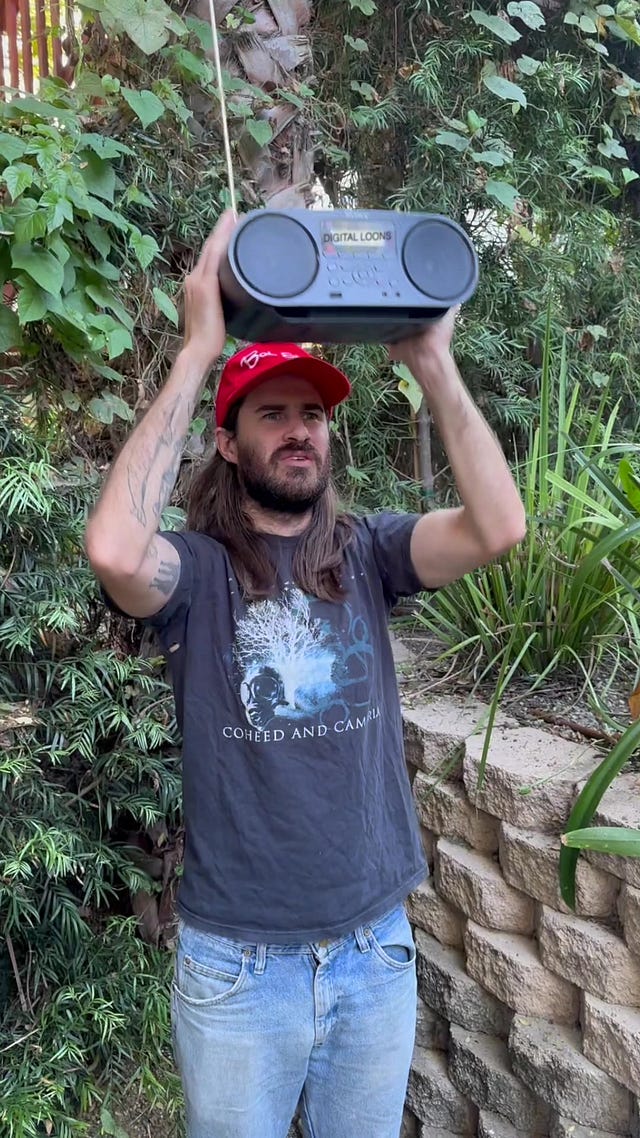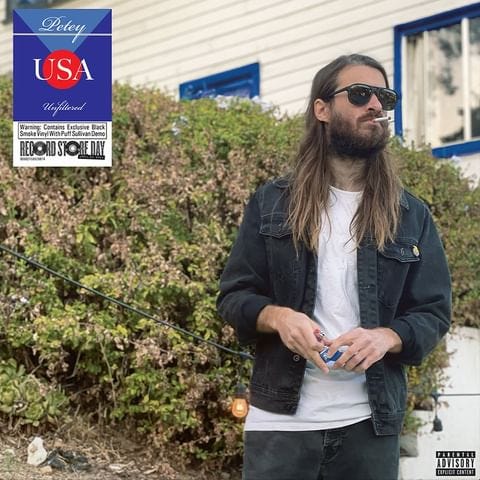Poets Wearing Headphones: Petey's "The Freedom to F*ck Off" Is a Masterclass in Contrast
I'm taking the gloves off.
You’re reading Poets Wearing Headphones, a semi-regular feature at PopPoetry. In these posts, poets sound off (get it?) about songs they just can’t stop listening to and thinking about as writers, creatives, and people. If you enjoy this post and would like to see more or just want to support the writing that moves you, subscribe to get Poets Wearing Headphones and every weekly PopPoetry post delivered to your inbox.
The Poet
You know me. And if you don’t, I’m Caitlin Cowan, the creator and lead writer of PopPoetry: this weekly poetry and pop culture newsletter & blog-type situation. My first book, Happy Everything, just debuted with Cornerstone Press in 2024. I’ve been a writer since childhood and an educator for 15 years. I like to think hard about popular culture and the conversations it can have with poetry to help mint new readers and dismantle the wall between so-called “high” and “low” culture.
As a born-and-raised midwesterner, I resonate with other creatives who come from this place and make art out of its rustiness and its peculiar anodynimity, and I vibe even more so with those who also love one of my favorite artists: Peter Martin.
The Artist
Petey
Petey is a weird guy, but the kind of weird that makes you wish you two were friends.
He got big on TikTok making weird and weirdly hilarious videos during the pandemic. A millennial like me, Petey dresses like a hyper-casual hipster but isn’t annoying about it: in fact, it’s endearing. He clearly takes pleasure in his presentation, but not in a way that makes you roll your eyes. He knows what he’s about, to borrow a phrase from Mr. PopPoetry.
 Tiktok failed to load.
Tiktok failed to load.Enable 3rd party cookies or use another browser
The Song
“The Freedom to Fuck Off”
USA (2023)
Petey finally released a full-length in 2023, and its lead single, “The Freedom to Fuck Off,” is a masterclass in contrast and contains some of the best-written lyrics I’ve heard in a long, long time. Here’s how the song opens:
So what do I want? I want the freedom to fuck off
In the middle of the ice tonight, I’m squarin’ up, and I'm takin’ the gloves off
Hell, what do I need? I need the freedom to smell bad
’Cause this ain’t relaxin’, thinkin’ ’bout way too much in a warm bath…
From the first moments: genius. What do I want? is a common question. But Petey’s answer is shockingly unusual. But even then, is it?
He foregrounds the image of loneliness first: the middle of the ice. What ice? A darkened lake? An ocean lip? No: the center of a hockey rink. He’s about to start a fight. The fourth line is the equivalent of an “unpopular opinion,” in this case, baths aren’t as relaxing as they’re made out to be.
He continues:
Fuckin’ off takes money, fuckin’ off takes time
Been fuckin’ off wrong my whole life, now I’m fuckin’ off right
And I read the Bible sometimes—please don’t make fun of me
And I have come that they may have life and have it abundantly.
Things get a little more serious here. I love the way Petey addresses the privilege of “fucking off“ and thinks hard about what it means to have freedom. He seems to realize here that in order to truly “fuck off“ he will have to seriously disrupt the system, or ask big, tough questions he may not previously have been ready to ask. Already, the contrast between the seemingly fluffy, profanity-laden surface and its depths is starting to come into view.
He then makes an interesting admission (another seemingly unpopular opinion): that he reads the Bible. But the Bible verse he then quotes is a very deeply good and generous one. I have come that they may have life and have it abundantly. This is from John 10:10. This phrase is interesting because Petey will repeat it later, but it will have a different valence next time.
In the next verse, Petey echoes the image he’s already offered us of a man taking his gloves off in the middle of the hockey rink: a man freaking out in the middle of the street. You’re almost sure he’s talking about something that’s happening in the middle of the night again. His question, “So what do I want? I want the freedom to break down.” Is poignant. We absolutely, unequivocally do not live in a world where it is OK or safe to break down. To say nothing of lacking mental health structures and adequate mental healthcare for us all, there is no space in capitalism to stop working, to stop, at all, ever, for any reason, let alone to “break down.”
Petey’s requests are starting to seem really fucking reasonable.
His next desire, “the freedom to eat shit” is both literal and metaphorical. He talks about being “at the table,” which is an idiom that also means to have a stake in a shared project. As a white male with hair, as Jack Donaghy would say, Petey is certainly someone who’s at the table even as they feel disenfranchised by it and by the knowledge of how many other tables there are ahead of him. Petey says he’s at the table but doesn’t want to be there. He doesn’t want a privilege that he has—what he would actually like are other privileges: the freedom to be who he is, to break down, to be, as Mary Oliver might put it, a soft animal.
The next section builds to the first musical crescendo, before which Petey makes us understand that his desire to “fuck off“ is really a desire to be in community with other people. He’s not satisfied with the way things are: “I love to hate my country, man, I wanna bite the hand that feeds me,” he sings. He would like to fuck off out of this system that we have and into something better. “Let’s fuck off together,” he says. The big, crashing tidal sound of this first crescendo hints about what will come next: the real emotional crux of the song.
You thought this song was gonna just be something funny because it had the F word in it, right?
Things get quiet. Petey sounds more serious than ever. “So what do I want?” He asks. He wants the freedom to sit still, “to appreciate [his] state in the spinnin’ blades of a windmill.” And while his desire to contemplate himself in a windmill could be a mere moment of meditation that could happen anywhere, it also puts me in mind of Don Quixote. I think we could go down a rabbit hole here and think about the extent to which our antagonists are improperly understood—about the ways in which we all might be fighting the wrong enemies in terms of increasing our own happiness and wellbeing—but this post can only be so damn long. Think I’m onto something? Let me know in the comments!

The song is almost over. What does he want? The freedom to feel good. Fuck man. That’s all we ever want. Petey reminds us that it’s not merely a choice to be happy: if he could choose it, he says, he would choose it every second he could. Instead, he’s hinting at a deeper knowledge that it’s hard to be happy when the systems that surround you are engineered to serve only the few and not the many.
You thought this song was gonna just be something funny because it had the F word in it, right? Check out the final verse:
I wanna be a real man, I wanna be a father
I’m so tired of thinkin’ ’bout me, man, I think I need to worry about a daughter
And I’ll talk to God through her eyes, please don’t make fun of me
I have come that they may have life and have it abundantly
And I have come that they may have life and have it abundantly
This is the most intimate part of the song in which the singer reveals his desire to grow up to meet the challenges of the next phase of his life. He is worried about this transition from only caring about himself to caring about someone else. When you’re a father, you can’t just fuck off, but there are many other perks. Petey is thinking about growing up and about what freedom really means.
When he says he wants to worry about a daughter, it’s true that there’s a slight flavor of potential misogyny or paternalist, misplaced paternalistic feeling. I could take that and run with it, but I think the real story is in his willingness to “talk to God through her eyes.” In other words, by having children, he hopes to understand the infinite. He will have, at last, a real sense of what it’s like to create something, or to create someone. Now, this time, when he says “I have come that they may have life and have it abundantly,” we hear it not from the mouth of God but the mouth of the secular father, the speaker: a speaker who is learning his place the order of things.
He wants the freedom to fuck off. He wants the freedom to say no to anything that does not matter as much as talking to God through the eyes of your child. It’s a deeply beautiful sentiment and a beautiful song.
I love this song because of its emotional highs and lows as well as its mixture of vulgarity with deep, sincere feeling. I suppose it’s a bit like what I aspire to as a poet. These contrasts, the gritty textures of his voice, the humor and pathos, and the sense of confession in both the poetic and the religious sense all inspire me to be just as great a poet as Petey already is.
Are you a poet who’s obsessed with music? Pitch me your Poets Wearing Headphones post at poetrygoespop at gmail dot com. I’d love to hear from you!







ahhhh love this!